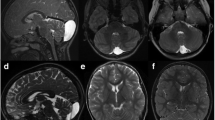Abstract
The aim of the study was the functional neurodevelopmental assessment of children with posterior fossa tumors, specifically examining whether tumor location in particular cerebellar structures determines particular neuropsychological deficits. The examined group consisted of 34 children treated between 1999 and 2007 at the Division of Pediatric Neurosurgery Silesian University Medical School in Katowice, Poland. Twelve girls and 22 boys between 5 and 21 years of age were examined. The mean age was 12.3 years. There were 21 total and 8 subtotal resections of tumor, and marsupialization was performed in cases of arachnoid cysts. Hydrocephalus in 19 patients was fixed surgically. Histopathological diagnoses of tumors were as follows: 4 medulloblastomas, 8 pilocytic astrocytomas, 6 fibrillary astrocytomas, 1 anaplastic astrocytoma, 2 oligodendrogliomas, 4 anaplastic ependymomas, 1 choroid plexus papilloma, and 5 arachnoid cysts. The children were assessed by age-appropriate tests that examine higher mental functions such as cognitive processes, visual–spatial functions, verbal fluency, planning, sequential memory, and emotions. Additionally, speech examination and tests were performed. The clinical state of all patients was also evaluated, including a full neurological examination. Posterior fossa tumors can disturb normal development of higher mental functions, especially in the development of linguistic and emotional traits. Our study aimed to better understand the functional anatomy of the cerebellum in the context of behavioral changes. Exploration of the consequences of damage to posterior fossa structures may lead to a better understanding of their function in the emotional and cognitive development of children. Moreover, this work may enable the prediction of neurobehavioral disorders and offer appropriate strategies for rehabilitation, qualification, and surgical procedures.
Access this chapter
Tax calculation will be finalised at checkout
Purchases are for personal use only
Similar content being viewed by others
References
Duffner PK, Cohen ME (1991) The long-term effects of central nervous system therapy on children with brain tumors. Neurol Clin 9:479–495
Gilberg C, Coleman M (1992) The biology of autistic syndromes. MacKeith, London
Heideman RL, Packer RJ, Albright LA, Freeman CR, Rorke LB (1993) Tumors of the central nervous system principles and practice of pediatric oncology, 2nd edn. JB Lippincott, Philadelphia
Levisohn L, Cronin-Golomb A, Schmahmann JD (2000) Neuropsychological consequences of cerebellar tumour resection in children. Brain 123:1041–1050
Malm J, Kristensen B, Karlsson T, Carlberg B, Fagerlund M, Olsson T (1998) Cognitive impairment in young adults with infratentorial infarcts. Neurology 51:433–440
Mulhern RK (2001) Risks of young age for selected neurocognitive deficits in medulloblastoma are associated with white matter loss. J Clin Oncol 19:472–479
Pollack IF, Polinko P, Albright AL, Towbin R, Fitz C (1995) Mutism and psudobulbar symptoms after resection of posterior fossa tumors in children. Neurosurgery 37:885–893
Reimers TS, Ehrenfels S, Mortensen EL, Schmiegelow M, Shnderkaer S, Carstensen H, Shmiegelow K, Muller J (2003) Cognitive deficits in long-term survivors of childhood brain tumors: identification of predictive factors. Med Pediatr Oncol 40:26–34
Ris MD, Packer R, Goldwein J, Jones-Wallace D, Boyett JM (2001) Intellectual outcome after reduced-dose radiation therapy plus adjuvant chemotherapy for medulloblastoma: a Children’s Cancer Group study. J Clin Oncol 19:3470–3476
Riva D, Pantaleoni C, Milani N, Fossati Belani F (1991) Combined treatment modality for medulloblastoma in childhood: effects on neuropsychological functioning. Neuropediatrics 22:36–42
Riva D, Giorgi C (2000) The cerebellum contributes to higher functions during development. Brain 123:1051–1061
Riva D, Milani N, Pantaleoni C, Ballerini E, Giorgi C (1989) Impairment of neuropsychological functions in children with medulloblastomas and astrocytomas in the posterior fossa. Childs Nerv Syst 5:107–110
Schmahmann JD (1991) An emerging concept: the cerebellar contribution to higher function. Arch Neurol 48:1178–1187
Schmahmann JD, Sherman JC (1998) The cerebellar cognitive affective syndrome. Brain 232:567–579
Silveri MC, Di Betta AM, Filippini V, Leggio MG, Molinari M (1998) Verbal short-term store-rehearsal system and the cerebellum. Evidence from a patient with a right cerebellar lesion. Brain 121:2175–2187
Steinlin M, Imfeld S, Zulauf P, Boldshauser E, Lovblad KO, Ridolfi Luthy A, Perring W, Kaufmann F (2003) Neuropsychological long-term sequelae after posterior fossa tumour resection during childhood. Brain 126:1–11
Van Calenbergh F, Van de Laar A, Plets C, Goffin J, Cesaer P (1995) Transient cerebellar mutism after posterior fossa surgery in children. Neurosurgery 37:894–898
Young J, Ries LG, Silverberg E, Horm JW, Miller RW (1986) Cancer incidence, survival and mortality for children young than age 15 years. Cancer 58:598–602
Author information
Authors and Affiliations
Corresponding author
Editor information
Editors and Affiliations
Rights and permissions
Copyright information
© 2010 Springer-Verlag/Wien
About this paper
Cite this paper
Larysz, D., Blamek, S., Larysz, P., Pietras, K., Mandera, M. (2010). Posterior Fossa Brain Tissue Injury: Developmental, Neuropsychological, and Neurological Consequences of Brain Tumors in Children. In: Czernicki, Z., Baethmann, A., Ito, U., Katayama, Y., Kuroiwa, T., Mendelow, D. (eds) Brain Edema XIV. Acta Neurochirurgica Supplementum, vol 106. Springer, Vienna. https://doi.org/10.1007/978-3-211-98811-4_51
Download citation
DOI: https://doi.org/10.1007/978-3-211-98811-4_51
Published:
Publisher Name: Springer, Vienna
Print ISBN: 978-3-211-98758-2
Online ISBN: 978-3-211-98811-4
eBook Packages: MedicineMedicine (R0)




